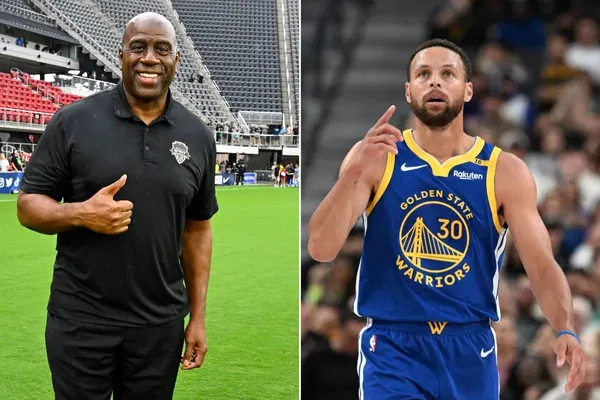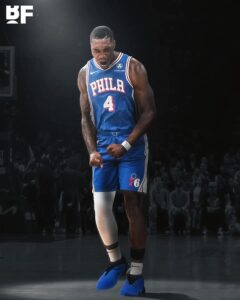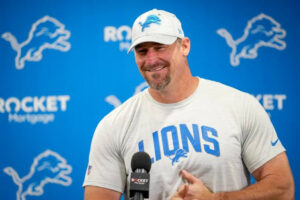
Lakers Rookie’s Tearful Confession Forces Magic Johnson to Share His Crown With LeBron & Steph Curry: A Turning Point in NBA Legacy Debates
In a shocking twist of events that no one saw coming, a tearful confession from the Lakers’ highly-touted rookie has sent ripples through the NBA world, forcing none other than Magic Johnson to reconsider his place in the league’s pantheon of greats. The rookie, whose name we will withhold for now, broke down in a post-practice interview, expressing his struggles with living up to the impossible expectations placed on young talent in today’s era of social media hype and relentless comparisons.
The young player’s emotional vulnerability was raw and unfiltered. “I grew up idolizing Magic, Kobe, LeBron, and now I’m out here every night wondering if I’m even worthy of wearing this uniform,” he confessed, tears streaming down his face. His words resonated deeply with fans and critics alike, but it was Magic Johnson’s unexpected reaction that has set the NBA ablaze.
Magic, the five-time NBA champion and Lakers legend, has long been considered the symbol of Showtime greatness, the architect of one of the most dominant eras in basketball history. He was the crown jewel of the Lakers’ legacy, embodying everything the franchise stood for—excellence, charisma, and sheer competitive will. But in a recent interview, when pressed on the rookie’s heartfelt confession, Magic dropped a bombshell that has left the basketball world divided: “It’s time to recognize that my crown isn’t just mine anymore. What LeBron has done here with the Lakers, and what Steph Curry has done for the game as a whole—these guys deserve that respect. Maybe even more than me.”
For a man who once seemed untouchable in Lakers lore, the admission was seismic. Magic has long resisted the idea of sharing his place on the Lakers’ Mount Rushmore with anyone not named Kareem or Kobe. But to hear him openly concede that LeBron James and Steph Curry have arguably surpassed his own contributions—especially as rivals in the 21st-century debate—is controversial, to say the least.
LeBron James, despite securing a championship with the Lakers in 2020, has always been a divisive figure among Lakers faithful. Many old-school fans see him as an outsider, someone whose legacy is tied more to the Cleveland Cavaliers or Miami Heat than to the storied Los Angeles franchise. His arrival in L.A. was seen by some as an opportunistic move, a Hollywood grab rather than a quest for basketball glory. And though he delivered a title, questions linger about whether he ever truly embodied the Lakers’ spirit the way Magic or Kobe did.
As for Steph Curry, the idea that Magic would voluntarily bring him into the conversation is even more controversial. Curry has built a dynasty of his own in Golden State, and while his impact on the game is undeniable, his inclusion in the conversation about Lakers royalty feels jarring. Lakers fans are fiercely territorial, and the notion that a non-Laker like Curry could share the throne with the likes of Magic, Kareem, Kobe, and now LeBron is almost blasphemous. Curry represents everything the Lakers are not—a Silicon Valley franchise that built its success on shooting threes, not flashy showtime dunks. And yet, Magic’s words seem to acknowledge a deeper truth about the evolution of the NBA.
The tearful rookie’s breakdown was more than just an expression of personal insecurity—it was a reflection of the crushing weight of history that young Lakers players now bear. The modern NBA is a league defined by legacy, where each generation is compared to the last, and where the pressure to live up to legends can cripple even the most talented players. Magic’s decision to open up this conversation feels like a tacit acknowledgment of this reality. He sees in LeBron and Curry the modern faces of what he once represented—the dominant figures who have changed the game and redefined success on their own terms.
But not everyone is ready to accept Magic’s concession. For many die-hard Lakers fans, the Showtime era remains untouchable, a golden age that no amount of championships won in the “bubble” or three-point revolution can eclipse. The idea that LeBron, whose time in L.A. has been marked by highs but also plenty of lows, could share the Lakers’ crown with Magic feels like a slap in the face to those who lived through the glory years of the 80s and early 2000s. And Curry? He’s a Warriors legend—a transformative player, sure—but one who built his kingdom up north in San Francisco, not in the shadow of the Hollywood sign.
This moment may signal a changing of the guard, but it also forces us to confront a larger question: Can legacies ever truly be shared, or does passing the torch necessarily diminish the greatness of those who came before?
In the wake of this emotional saga, we’re left with a complex, perhaps uncomfortable reality: the NBA’s legacy isn’t just written in the past, but constantly rewritten with every new era. For Magic Johnson to recognize LeBron and Curry as heirs to his throne is to acknowledge the unstoppable march of time. But as this conversation unfolds, one thing remains certain—no crown, no matter how well-worn, can stay on one head forever.
And as for that rookie? His tearful confession may have done more than unburden his soul—it might have been the catalyst that forever changed how we define greatness in the NBA.






